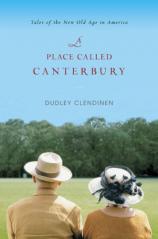Reading Group Guide
Discussion Questions
A Place Called Canterbury

1. In A Place Called Canterbury, a book largely devoted to the stories of other people, how does Dudley Clendinen reveal himself and his own story?
2. How well do you think the author responded to the choices raised by his mother’s failing condition? Would you have done anything differently?
3. While reading A Place Called Canterbury, with what group of people did you most identify? The residents? The staff? The family members who had to watch their parents grow older and weaker?
4. Who among the residents of Canterbury seem best able to cope with the fears and frustrations of old age? What character traits seem most valuable in coping with this phase of life?
5. Because so many of the residents of Canterbury suffer from dementia, reading A Place Called Canterbury sometimes feels like a journey into a realm of unreason. When reasonableness in dealing with someone is no longer an option, what alternatives are there? How does the book deal with the circumstances that arise when the power of reason has broken down?
6. Some of the aged women at Canterbury adopt and then discard a plan to pose nude for a calendar. How did you respond to this idea? Were you relieved or disappointed when it was abandoned?
7. How does the loss of privacy and independence that goes along with aging affect the residents of Canterbury? What are some of the ways in which they preserve individuality in the face of all the supervision and regimentation that they must undergo?
8. Few people are able to consider aging and all that it entails without some feelings of uneasiness. Are there issues that reading A Place Called Canterbury made it easier for you to confront? On the other hand, what portions of the book caused you discomfort?
9. What role does the consumption of alcohol play in A Place Called Canterbury? Why is drinking so central to the lives of many of the people described in the book?
10. Routine gives shape and security to the residents of Canterbury. However, resistance to routine gives some of them a needed sense of autonomy. Do you see your own parents in some of the characters at Canterbury? Do they need to go somewhere like that?
11. Were you surprised by the stories of sex and romance at that stage of life? Did you find them touching? Encouraging? Disturbing?
12. Do you think your own parents or relatives would be as honest with you as some of the residents of Canterbury were with the author?
13. Do you feel prepared to deal with this stage of your own parents’ or aunts’ and uncles’ lives? Have you talked with them about it? Have they given you power of attorney?
14. Are aging parents among the subjects that you and your own friends and peers are talking more about?
15. How would you feel about spending your old age in a place like Canterbury?
16. Would you like to read more about life at Canterbury after the year 2001?
A Place Called Canterbury
- Publication Date: May 1, 2008
- Hardcover: 400 pages
- Publisher: Viking Adult
- ISBN-10: 0670018848
- ISBN-13: 9780670018840







